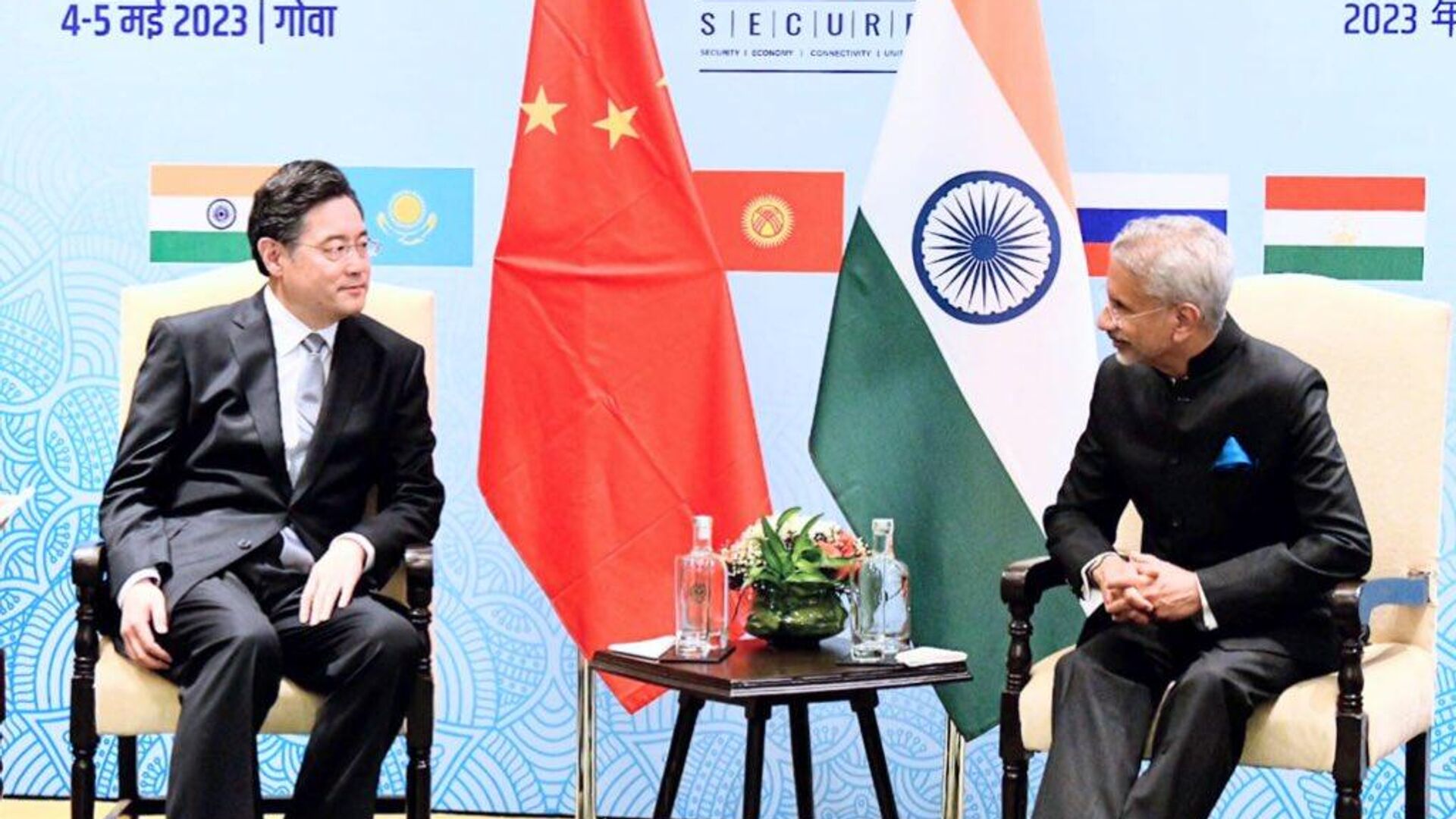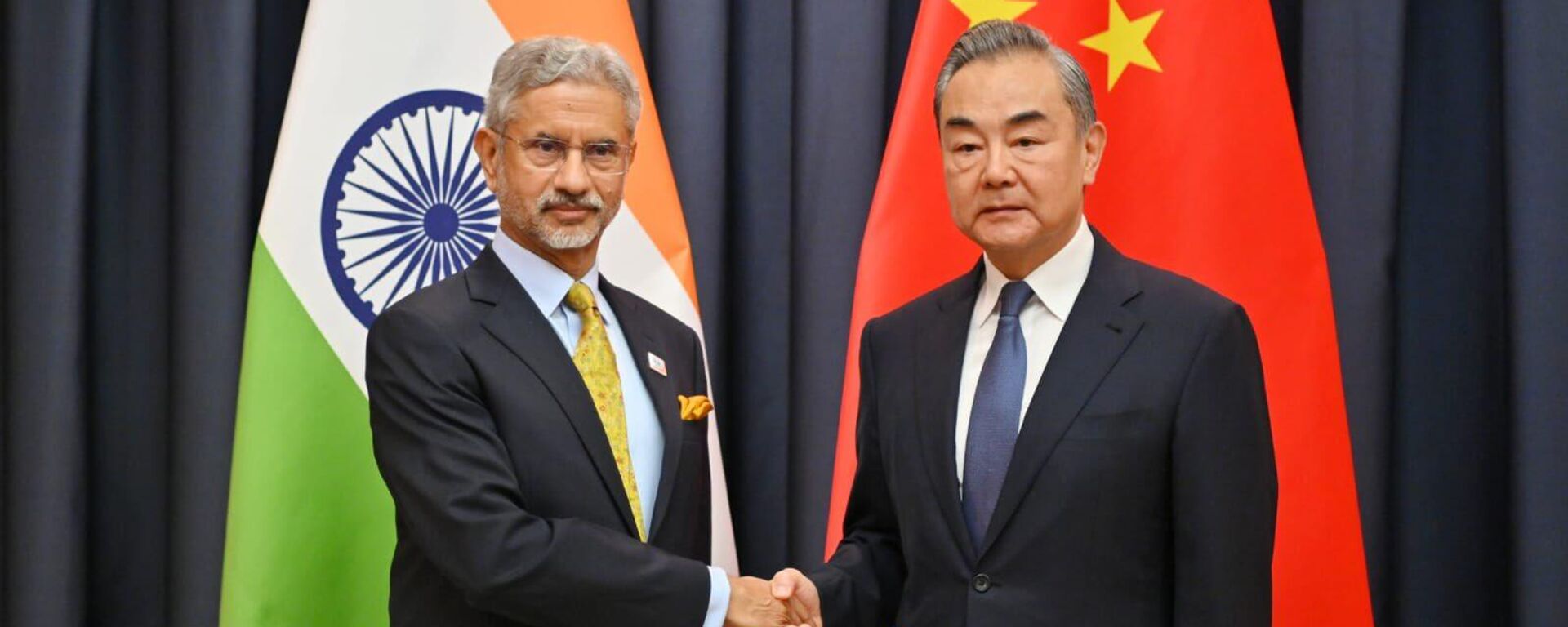https://sputniknews.in/20241203/sino-india-ties-have-improved-since-disengagement-pact-jaishankar-8487494.html
Sino-India Ties Have Improved Since Disengagement Pact: Jaishankar
Sino-India Ties Have Improved Since Disengagement Pact: Jaishankar
Sputnik India
The conclusion of disengagement of Indian and Chinese troops marks a major step in resolving the eastern Ladakh standoff, which New Delhi says had "adversely impacted" the Sino-India ties.
2024-12-03T18:59+0530
2024-12-03T18:59+0530
2024-12-03T18:59+0530
ladakh standoff
s. jaishankar
wang yi
ajit doval
china
ladakh
india
border dispute
border clashes
border infrastructure
https://cdn1.img.sputniknews.in/img/07e7/05/04/1821411_0:172:1024:748_1920x0_80_0_0_eca7c0c42431a53321c5d3df01aefb66.jpg
India and China have achieved "full" disengagement in the eastern Ladakh region, and that the issue of de-escalation would be discussed between the two sides in "coming days", External Affairs Minister (EAM) S Jaishankar told the Parliament on Tuesday.He recalled that India had called for the 'comprehensive disengagement of troops in all the friction areas' during his meeting with Chinese Foreign Minister Wang Yi in Moscow in September 2020, which was the first high-level meeting between the two nations following the Galwan Valley clashes in June of the same year."It was also emphasised that the large concentration of troops along the Line of Actual Control (LAC) was not in accordance with the 1993 and 1996 Agreements," he said.He said that the disengagement from the friction points at the LAC had been the focus of Sino-India discussions at both the Working Mechanism for Consultation and Coordination on India-China Border Affairs (WMCC) and the Corps Commander Level Meeting since September 2022, when the last disengagement pact was concluded at Hot Springs area.He added that India's National Security Advisor, Ajit Doval, and his Chinese counterpart met in St. Petersburg on 12 September.The "next priority" would be to consider de-escalation, which would mean addressing the issue of massing of troops and equipment at the LAC, the top diplomat stated. He mentiioned that after the disengagement pact on 21 October, Prime Minister Narendra Modi and President Xi Jinping met on the sidelines of the BRICS Summit in Kazan, where both the leaders welcomed the development and directed their respective Foreign Ministers to "meet and stabilise and rebuild the relationship".The EAM stated that Defence Minister Rajnath Singh and China’s then Defence Minister Dong Jun also discussed de-escalation during their meeting on the sidelines of ASEAN Defence Ministers (ADMM+) in Lao PDR last month.Besides, Jaishankar stated that officials and military commanders from both the countries had held 17 rounds of WMCC and 21 rounds of Senior Highest Military Commander Level (SHMCL) meetings since June 2020 to resolve the standoff.Jaishankar also outlined India's "expectations" for the future of India-China ties, emphasising that peace and tranquility along the border would remain a prerequisite for a stable relationship.
https://sputniknews.in/20241119/indias-foreign-policy-marked-by-independent-action-jaishankar-to-wang-yi-8418405.html
china
ladakh
india
sino-indian border
kazan
asean
galwan valley
gogra hot-springs
tibet
Sputnik India
feedback.hindi@sputniknews.com
+74956456601
MIA „Rossiya Segodnya“
2024
Dhairya Maheshwari
https://cdn1.img.sputniknews.in/img/07e6/0c/13/138962_0:0:641:640_100x100_80_0_0_2cb44360dbcdf6d84bf4b299cd045917.jpg
Dhairya Maheshwari
https://cdn1.img.sputniknews.in/img/07e6/0c/13/138962_0:0:641:640_100x100_80_0_0_2cb44360dbcdf6d84bf4b299cd045917.jpg
News
en_IN
Sputnik India
feedback.hindi@sputniknews.com
+74956456601
MIA „Rossiya Segodnya“
Sputnik India
feedback.hindi@sputniknews.com
+74956456601
MIA „Rossiya Segodnya“
Dhairya Maheshwari
https://cdn1.img.sputniknews.in/img/07e6/0c/13/138962_0:0:641:640_100x100_80_0_0_2cb44360dbcdf6d84bf4b299cd045917.jpg
ladakh standoff, india china ties, india china trade, lac dispute, india china disengagement pact, india china news, ladakh dispute, pla news, modi xi meeting, modi xi brics, modi news, jaishankar news
ladakh standoff, india china ties, india china trade, lac dispute, india china disengagement pact, india china news, ladakh dispute, pla news, modi xi meeting, modi xi brics, modi news, jaishankar news
Sino-India Ties Have Improved Since Disengagement Pact: Jaishankar
"Recent developments that reflect our continuous diplomatic engagement since then have set our ties in the direction of some improvement," EAM Jaishankar said.
India and China have achieved "full" disengagement in the eastern Ladakh region, and that the issue of de-escalation would be discussed between the two sides in "coming days", External Affairs Minister (EAM) S Jaishankar told the Parliament on Tuesday.
"I would like to inform the House that disengagement has now been achieved in full in Eastern Ladakh through a step by step process, culminating in Depsang and Demchok. With the task of disengagement completed, it is now our expectation that discussions would commence in regard to the remaining issues that we had placed on the agenda," Jaishankar said in a statement.
He recalled that India had called for the 'comprehensive disengagement of troops in all the friction areas' during his meeting with Chinese Foreign Minister Wang Yi in Moscow in September 2020, which was the first high-level meeting between the two nations following the Galwan Valley clashes in June of the same year.
"It was also emphasised that the large concentration of troops along the Line of Actual Control (LAC) was not in accordance with the 1993 and 1996 Agreements," he said.
The "twin considerations of an unstable local situation and an impacted bilateral relationship", under discussion since September 2022, were the main drivers of the 21 October disengagement pact, Jaishankar said. Further, he informed the Parliament that the disengagement issue and the overall Sino-India relationship figured in his recent meetings with Wang Yi in Astana on 25 July and Vientiane on 25 July.
He said that the
disengagement from the friction points at the LAC had been the focus of Sino-India discussions at both the Working Mechanism for Consultation and Coordination on India-China Border Affairs (WMCC) and the Corps Commander Level Meeting since September 2022, when the last disengagement pact was concluded at Hot Springs area.
"The problem in these two areas pertained primarily to obstructions of our long-standing patrolling activity. In Demchok, there was also the question of access by our nomadic population to traditional grazing grounds, as well as to sites of significance to the local people," Jaishankar provided further details.
He added that India's National Security Advisor, Ajit Doval, and his Chinese counterpart met in St. Petersburg on 12 September.
The "next priority" would be to consider de-escalation, which would mean addressing the issue of massing of troops and equipment at the LAC, the top diplomat stated. He mentiioned that after the disengagement pact on 21 October, Prime Minister Narendra Modi and President Xi Jinping met on the sidelines of the BRICS Summit in Kazan, where both the leaders welcomed the development and directed their respective Foreign Ministers to "meet and
stabilise and rebuild the relationship".
"The Special Representatives [NSA Ajit Doval and Chinese FM Wang Yi] are also to oversee the management of peace and tranquility besides exploring a fair, reasonable and mutually acceptable solution to the boundary question," Jaishankar said.
The EAM stated that Defence Minister Rajnath Singh and China’s then Defence Minister Dong Jun also discussed de-escalation during their meeting on the sidelines of ASEAN Defence Ministers (ADMM+) in Lao PDR last month.
Besides, Jaishankar stated that officials and military commanders from both the countries had held 17 rounds of WMCC and 21 rounds of Senior Highest Military Commander Level (SHMCL) meetings since June 2020 to resolve the standoff.
Jaishankar also outlined
India's "expectations" for the future of India-China ties, emphasising that peace and tranquility along the border would remain a prerequisite for a stable relationship.
"The conclusion of the disengagement phase now allows us to consider other aspects of our bilateral engagement in a calibrated manner, keeping our national security interests first and foremost. In my recent meeting with FM Wang Yi, we reached an understanding that the Special Representatives and the Foreign Secretary level mechanisms will be convening soon," Jaishankar said.



